
The Strategic SENCo: intensive & impactful CPD for inclusion leads
24/5/2021
We’re thrilled to be launching our new Driving Inclusion system: two intensive and comprehensive six-week programmes for key members of the school’s workforce. Hosted on our new online learning hub, the programmes will improve SEND provision, inclusion and literacy strategy across your school. In this blog, DYT consultant teacher, ?Kenny Wheeler, introduces our new programme for SENCos and inclusion leads: The Strategic SENCo.
Tell us about the programme.
The Strategic SENCo will equip SENCos with skills and knowledge needed to carry out their increasingly complex and challenging role. Over six modules we look at leadership, context, assessment, working with stakeholders, high quality teaching and leading change. Throughout the programme, participants will be encouraged to reflect on their own context and decide what action needs to be undertaken in order to improve inclusive practices in their settings.
What inspired you to create The Strategic SENCo?
I was a SENCo for 11 years and then supported SENCos across an LA for over 5 years. Through these experiences I came to realise just how much is expected of SENCos, often with little support or direction. Advice given is often generic and misses out the finer points of what actually needs to be done. As a result, SENCos are none the wiser once it has been given!
I am passionate about coaching and mentoring. I created this programme to help further develop SENCos so they can tackle the strategic challenges in their setting and effectively implement and embed changes to improve inclusive practices. The programme focuses on sustainable development, guiding participants to create a plan for leading inclusion in their setting.
The programme is meant to tackle some unique challenges that SENCos are facing. What are these and have priorities changed since the pandemic?
SENCos have to work with a variety of stakeholders, some of whom have contrasting priorities and expectations. This can put additional pressure on SENCos who have to mediate between multiple parties so that support can be accessed with all the relevant paperwork being completed in order for this to happen.
Thanks to limited SEND training, some teachers might lack the skills and confidence to meet the diverse needs of learners. As a result, SENCos often have to intervene and provide additional support and guidance so that colleagues can engage learners who may have difficulty accessing the curriculum. SENCos need to be able to deliver training to all their colleagues to ensure consistent high quality teaching is consistent.
During the pandemic there has been a lot of uncertainty and plenty of anecdotal views relating to gaps in learning. The continued challenge for SENCos is to understand where gaps exist and source provision in order to address any such gaps. We know from Ofsted’s Covide-19 briefings that concerns included the use of phonics along with reading fluency and comprehension. In younger learners, concerns also related to language development as leaders felt speaking and listening skills were weaker than they should be.
In addition to all the other challenges, getting access to external agencies and having them visit a school setting has been an issue, meaning that some learners have not had the benefit of prompt intervention. Equally, being able to move school staff around has been a logistical challenge because of mixing bubbles. So accessing and mobilising support has been a real challenge as a result of the pandemic.
How does the programme tackle these challenges and how is it different to other CPD on the market for SENCos?
The programme looks at how SENCos can use their leadership skills to better understand their context, identify appropriate provision and lead on whole school improvements and changes such as high quality teaching. The practical application sets the programme apart from others on the market. Rather than being theory-based we pose the ongoing questions of ‘What does this mean for you in your setting?’ and ‘What do you need to do as a leader to make positive changes?’.
We carried out research into the impact of other SEND training including the NASENCo award. Through our analysis we identified key areas that will help SENCos to carry out their role more effectively. Again, the practical application rather than theoretical coverage will help support SENCos in leading SEND within their setting.
What will schools and SENCos get from the programme?
The Strategic SENCo takes participants on a leadership journey that will help develop how they lead SEND in their settings. They will gain strategies and tools to better understand their own leadership, their setting’s SEND profile, appreciate what additional provision they need to put in place and how to plan and lead improvements in their school.
The programme empowers SENCos to lead strategically. They’ll learn to juggle operational aspects of the role with strategic changes to improve the education of all learners.
Schools should enrol their staff if they want to help support their overall professional learning and development. This programme is going to make a difference to a SENCo’s practices and will help them further develop SEND within their setting to help improve outcomes for SEND learners.
The online programme offers a really dynamic learning experience. We have a blended offer which has both live and recorded tutorials for challenge and reflection. We have a host of resources to help support SENCos in making changes within their setting. There are also discussion boards and forums so that participants form a community to help share and support each other’s reflection, learning and next steps.
Bookings for The Strategic SENCo are now open. For more information please head to our website or contact the team on programmes@driveryouthtrust.com.
Kenny Wheeler
Senior Consultant Teacher, DYT
Kenny became a SENCo in 2002 and worked in senior leadership roles for over ten years. He has led SEN and Inclusion departments to Outstanding and was recognised as a lead SEND practitioner. Through consultancy, raising leadership capability and improving provision for SEND, he has delivered support to schools across the country.

